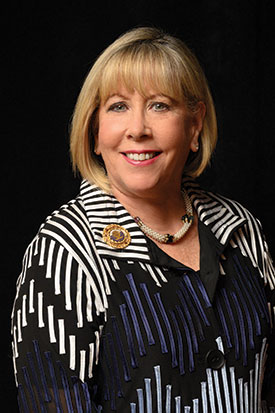Hadassah
President's Column
Can We Take the Good News?

Hadassah National President
Covid variants, renewed travel bans, panicked markets, political polarization, challenges from Russia and China, civil wars, massing refugees. Every day we live under a cloud of headlines about crises, conflicts and disasters.
One thing shared by many cultures is shining a light in December, not only to find our way forward in the darkness, but also to better appreciate our own resources and resilience. And viewing today’s urgent problems in the seasonal light, it occurs to me that we are not experiencing more crises, conflicts and disasters today but seeing the world’s ills with more clarity.
The future is unpredictable, but history—and we all know what happens to nations that don’t study history—offers clues for navigation. Despite all the challenges we face, by most measures humanity is better off at the end of 2021 than it has ever been, better than in 1921, just as 1921 was better than 1821 and far better than 1421. In broad terms we might say that for every two steps forward the world takes one step back. The bad news is that those backward steps tend to dominate our imagination.
Take the Omicron variant: Even as medical experts started delving into its severity and whether it can bypass the immunity from Covid vaccines and previous infections, officials at Pfizer and Moderna made it known that they could retool their booster shots to combat it. Whatever future the coronavirus might have, it will not rob us of the knowledge we have gained and progress we have made since March 2020. It once took centuries to develop treatments for new diseases; the first Covid vaccine took less than 10 months.
We need to take a deep breath—and shine a bright light—over all the problems of our day. We tend to get stuck in the moment without considering how far we have come and what resources exist to get us to the next step. AIDS, Covid, cancer, diabetes, heart disease, infertility, non-invasive surgery—on virtually any medical challenge you can think of, we are better equipped today than ever.
At the beginning of 19th century, no country had a life expectancy at birth higher than 40 years. Now global life expectancy is 72.6. Most people in world today can expect to live as long as citizens of the very richest countries lived in 1950.
The transparency we have today to see problems close up is a good thing, but like a vaccine it has a side effect: It can disable our perspective. Poverty is a reality but the percentage of the world’s population living in poverty is now lower than at any time in history. War is real but the percentage of people dying from its ravages is also at a historic low point. And since 1800 the world’s literacy rate has risen steadily, from 12 to 85 percent.
The events of the day are important but so is the event cycle of the century. News content is repetitive and surely there is more room for the work of scientists who take the long view, like Harvard cognitive psychologist Steven Pinker and the Oxford researchers behind the online publication ourworldindata.org, whose data surveys I draw on here.
Of course the world has urgent problems, including one—global warming—that represents an unprecedented challenge. Of course we can’t just sit back and count on humanity. Certainly not everyone contributes equally to human progress; ingenuity has always been dependent on the dedication of a critical mass of nations, communities and individuals to mobilize, pooling ideas and energies. One reason we take such pride in Hadassah is that our impact is global—our work strengthens not only the Jewish people but all peoples.
At this time of year let’s take renewed inspiration from humanity’s instinct and knowledge. There are lots of people who prefer to curse the darkness, but it only takes a minority to light enough candles to see the world clearly—and save it.








 Facebook
Facebook Instagram
Instagram Twitter
Twitter
Leave a Reply